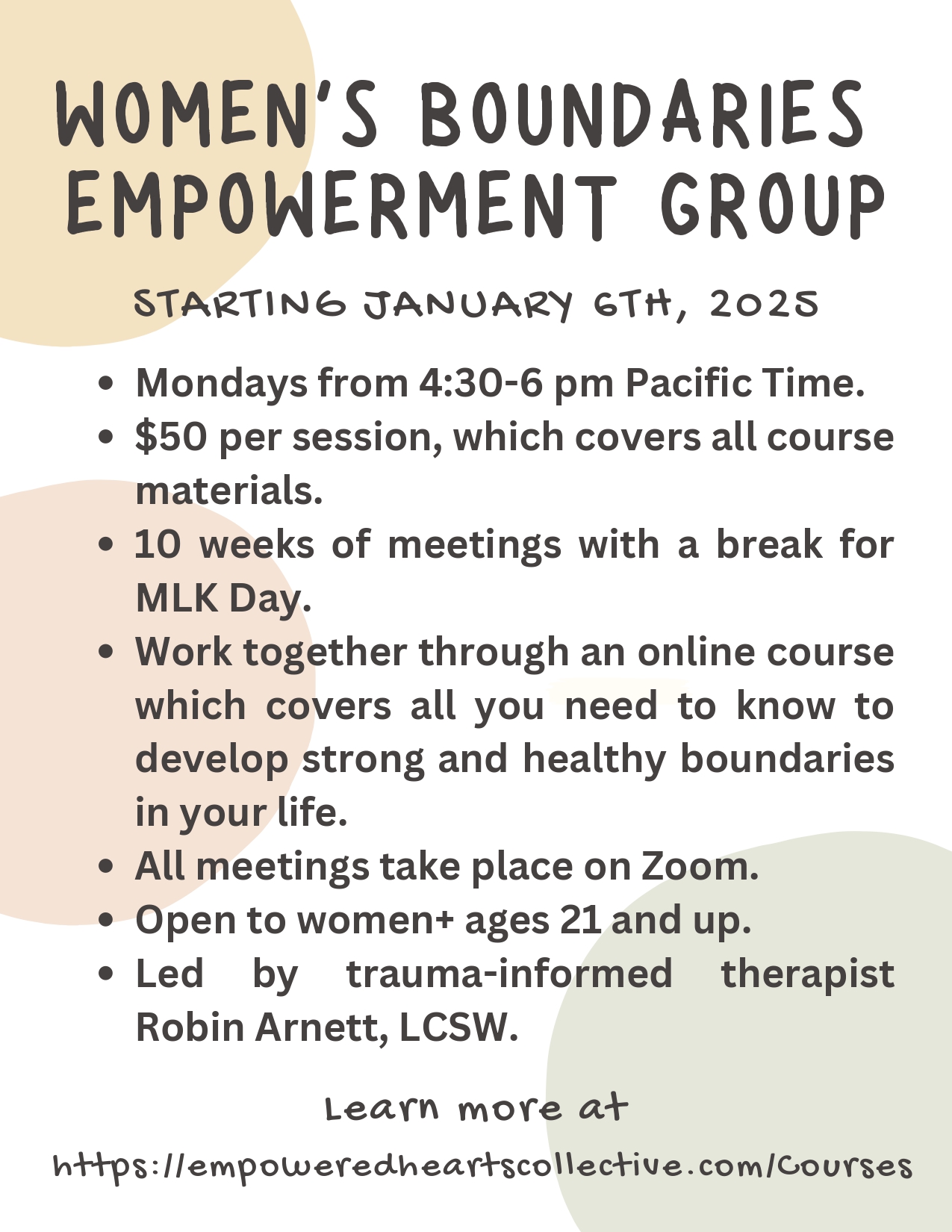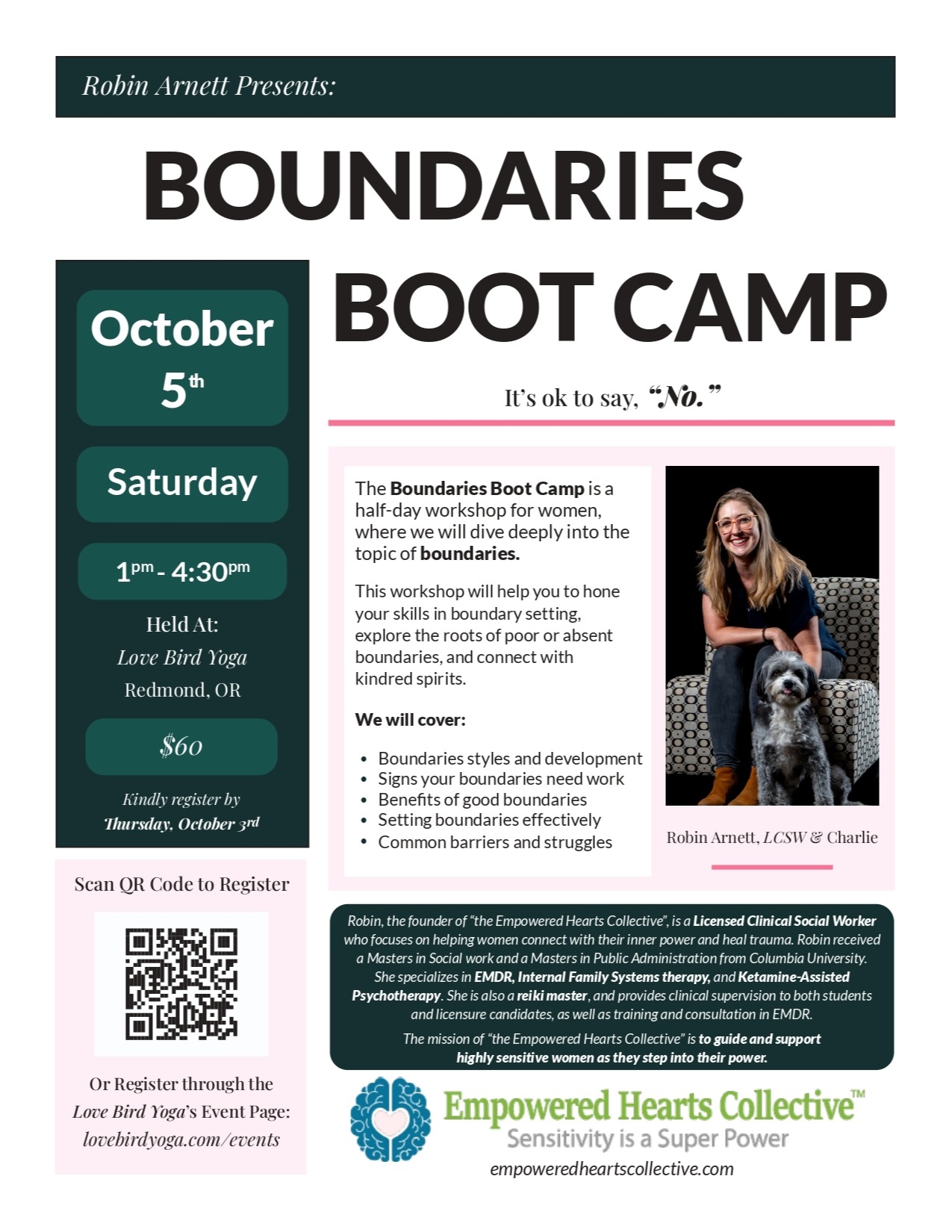Take the first step to stronger boundaries—unlock your free course, Module 7: Setting Effective Boundaries, from the Intuitive Boundaries Mastery Series.
Unlock Free ModuleDebunking Boundaries Myths
The Top Four Myths That Can Get in Your Way
By Robin Arnett
When you say the word boundaries, people have a lot of different ideas about what boundaries are and are not. Unfortunately, these ideas are often based in myths and misconceptions. Some of these mistaken ideas can even be major barriers to setting boundaries in your life.
In this blog post, I’ll break down some of the most common myths and misunderstandings around boundaries to help you get clear and have confidence.
The Top Four Boundaries Myths
-
Boundaries are mean or selfish.
-
Setting boundaries will hurt my relationships.
-
I can’t set boundaries because people won’t let me.
-
Boundaries have to be harsh and unyielding.
Myth #1: Boundaries are Mean or Selfish
The first myth that we’ll explore around boundaries is that boundaries are mean or selfish. “Mean” and “selfish” are, ironically, often used as weapons against people who are extremely kind and giving. People with manipulative tendencies use these accusations because they know they have extra sting for people who make a point to be generous and compassionate.
Setting boundaries might mean that you’re not giving people what they want or expect from you, but that’s not the same thing as being selfish.
The idea that boundaries are selfish is rooted in a scarcity mindset that assumes that if you’re taking care of yourself, you’re neglecting others. I’d like to suggest an alternative mindset that says that the more joyful, energized, and in balance we are, the more we will have to give to those around us. What feeds and takes care of you has an exponential effect on what you’re able to offer the world. You matter, and if you are ignoring your needs and rights, you are ignoring the needs and rights of a person with inherent value, you.
Myth #2: Setting Boundaries Will Hurt My Relationships
The next myth is that boundaries will hurt your relationships. It’s true that boundaries will challenge the dynamics of some of your relationships, but changing isn’t the same as hurting. Boundary setting often means breaking established patterns and setting new norms, and that can make people uncomfortable. This process can be especially disruptive when there is one person in the relationship that is taking advantage of a boundary imbalance.
People don’t like to be called out or asked to change, but strong boundaries have positive effects on your relationships long term.
Positive Effects of Boundary Setting:
- Boundary setting will help you to identify relationships and relationship dynamics that have not been serving you. Giving less energy to toxic relationships frees you up to put more energy into positive relationships, and opens you up to new connections.
- Setting boundaries, i.e. expressing your needs and feelings, will strengthen the relationships that you have that already have a good foundation. Setting boundaries is, in fact, a vulnerable act that will allow you to be a fuller version of yourself in any relationship. The more you, the better.
Remember that setting boundaries is not a betrayal of the people around you, but failing to set boundaries is a betrayal of yourself. You are responsible for taking care of you.
Myth #3: I Can’t Set Boundaries Because People Won’t Let Me
Another misconception around boundaries is that you can’t set boundaries because the people in your life won’t let you. While it’s true that people may attempt to prevent you from setting boundaries by pushing back and trying to talk you out of it, the truth is that you have control over your boundaries, and nobody else.
The key here is how much you are willing to reshape your life in order to set them.
Four paths you can take when your boundaries are crossed:
- Confront the situation.
- Create distance.
- Leave the situation or relationship.
- Do nothing and wait to see if something changes.
There really are no other options. Realizing that these are your choices illuminates which options you are choosing every day.
Ultimately, our boundaries are about us, not about changing someone else. These may be difficult choices, but they are, in fact, in your control. Trust me, trying to change another person is the most reliable possible way to get hurt, and to waste your time and energy. Focus on what you can actually control, because it may be more than you’re acknowledging.
Myth #4: Boundaries Have to Be Harsh and Unyielding
The last myth that I’ll cover is that boundaries must be harsh and unyielding in order to be effective. In actuality, flexible, adaptable boundaries are the most effective, and will be the most authentic to your situation on any given day.
Rigid or weak boundaries are both inappropriate in different ways. Life changes, people change, and the way you feel changes, and your boundaries can reflect those changes as you learn and grow.
Rigid Boundaries:
Boundaries that are overly rigid are characterized by black and white parameters, inflexibility, and unwillingness to change based on new information. Although it’s important to stay consistent with your deal breakers, with the right people, flexibility and conversation can be helpful in setting effective boundaries that feel good to everyone involved.
For example, an initial boundary of expecting someone to be on time consistently could evolve to include caveats for updates from the other person to let you know that they’re running late. The possibility for negotiation will all depend on context, but with the right, safe people, an alternative option that you come up with together can make a lot of sense.
Porous Boundaries:
Porous boundaries exist when your boundaries are too weak, or don’t exist at all. When your boundaries are porous, it’s common to never say no, to take on more than you can handle, to accept bad treatment from others, and to struggle to maintain good habits and self-care.
Boundaries work best in the “Goldilocks Zone.” How flexible you are and the negotiations that you make around your boundaries will depend on what feels right to you.
Boundaries Facts
If you’re carrying around assumptions about boundaries that aren’t accurate, it’s likely that these ideas are making boundary setting difficult. Here are some boundaries facts to help motivate and empower you:
- Taking care of yourself puts positive energy into the world.
- Unhealthy relationship dynamics hurt everyone involved.
- Setting boundaries reveals toxic patterns.
- Boundaries lead to more authenticity, which leads to greater love.
- Only you have control over your boundaries.
- Effective boundaries are flexible and adaptable.
Remember that taking care of yourself is an act of love that serves the whole world. You got this!
If you’re ready to go deeper into setting and maintaining boundaries that truly work for you, the Intuitive Boundaries Mastery Series is designed to help you do just that. Through guided exercises, real-life strategies, and supportive insights, you’ll gain the confidence to set boundaries in a way that feels both empowering and sustainable. It’s about creating space for what truly matters—without guilt or second-guessing. If that sounds like something you could use, I’d love for you to join me!


